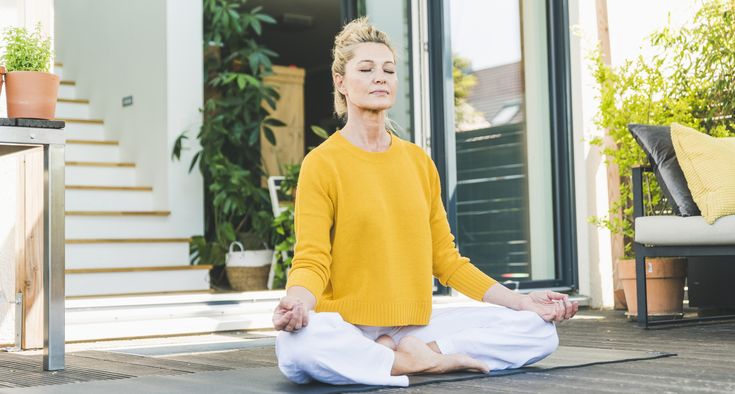What’s one of the best ways to stay more youthful and healthy? Avoid chronic inflammation.
It’s a phrase we hear constantly, though it can be challenging to describe in everyday language. We’ll try here: Chronic inflammation is a condition that often occurs when unhealthy lifestyle habits constantly trigger our immune system even when that system is not needed. That, in turn, can damage tissue and contribute to conditions like heart disease, arthritis and others.
Chronic inflammation can happen whether you’re 20 or 80. And the signs can be subtle, said Dr. Brian Ingold, doctor of osteopathic medicine with Novant Health Arboretum Family & Sports Medicine in Charlotte.
Patients tell him, “I don't know what it is, but I don't quite feel right,” “I’m more sore than I used to be,” or “I'm just not quite as sharp as I was.”
Being overweight can trigger chronic inflammation. People at a healthy weight can experience it, too, due to their diet, level of exercise, sleep habits or stress levels.
Ingold finds managing sleep and stress are the most challenging for patients. Here’s his plan for how you can address chronic inflammation, slow down the effects of aging and improve your health.
A primary care physician can help you live your best life.
A doctor's tips for reducing chronic inflammation to improve your health
Sleep: It’s not just for beauty
Americans often equate sleep with a lack of productivity, Ingold believes. But inadequate sleep throws off your circadian rhythms and makes your stress hormone levels skyrocket. “There’s a reason why high-level athletes do not compromise their sleep no matter what,” Ingold said.
Get better sleep by:
Listening to your body and disconnecting. Generations before us didn’t have the ability to stay connected to jobs and commitments 24/7. “It’s just very atypical from an evolutionary standpoint,” Ingold said. Create your own ritual of winding down for the night, starting with shutting off your devices. Easier said than done, we know. Ease into it if you have to. Turning off notifications can be a great start. Ask yourself: Do I really need to be made instantly aware of social media posts and news events that are far beyond our control?
Creating habits conducive to sleep. Seven hours of sleep (not just time in bed) is the minimum for good health. Keep your bedroom dark and cool, and maintain a consistent wake-up time when possible.
If you have sleep difficulties, notice what you’re doing in the hour or two before bed and make changes. Contact a sleep medicine specialist if you can’t beat insomnia on your own. Find one here.
Stress: Mix quick and in-depth remedies
Many people have grown accustomed to high levels of stress. Some people seem to thrive on it. That’s not good for us. What happens inside your head radiates through the rest of your body, setting off alarms and doing damage.
Ingold encourages patients to think through what’s non-negotiable in their lives, from spending time with their kids to finishing a degree at night. From there, take a look at your schedule and work in time to decompress.
Reduce stress by:
Getting some rays during the day. Many people work all day in artificial light. “I can’t imagine that’s the way we were meant to operate. It can have a lot of psychological ramifications,” Ingold said. Enjoy a burst of sunshine with an outdoor lunch or a short walk during your break.
Trying a five-minute meditation. Set a timer and spend five minutes meditating or breathing. If you like apps for encouragement, try Headspace or Calm.
Squeezing in a few minutes of exercise at work. Instead of a sit-down meeting, see if your colleague would like to talk while walking outside. Or close your door and do simple exercises like rising from your chair multiple times with your arms crossed over your chest.
Practicing yoga. Yoga affects a group of proteins that can lower the volume, so to speak, of genes causing inflammation, according to Ingold. Yoga also increases anti-inflammatory proteins, which help control how the immune system responds.
Talking with a therapist. Ingold describes himself as a massive fan of therapy for people facing significant anxiety or stress. Some forms of therapy are long-term, but others, such as cognitive behavioral therapy (CBT), focus on more immediate relief. The National Health Service in the U.K. suggests a selection of self-help CBT techniques.
Ask your primary care physician about Novant Health’s mental health app with videos, journaling, breathing exercises and other guidance available anytime.
Eat one-ingredient foods
“I don't think we've ever lived in a time where it's both easier and more difficult to eat healthy in the U.S.,” Ingold said. “There's nothing in nature, from a nutrient density standpoint, that mimics a cupcake or donut. We’ve created these things specifically to hijack your brain and want more of it.”
Best doctors. Amazing nurses. Remarkable care.
Click here for more healthy-living tips from medical experts.
He advises patients to eat as many one-ingredient foods as possible. As Ingold puts it, the only ingredient in an apple is apple. These foods also tend to be packed with vitamins and minerals while lower in calories.
Leafy greens and cruciferous vegetables such as broccoli help reduce inflammatory molecules in the body. Asparagus, onions and bananas have prebiotic benefits for the immune system, while yogurt and kimchi offer a probiotic boost to the immune system and digestion. Cook with turmeric, garlic and ginger as a tasty way to tamp down inflammation. Enjoy fatty fish like tuna for omega-3 fatty acids.
Exercise: Two minutes here, three minutes there
Build exercise into your day, just as you build in time to brush your teeth. For people who can’t find blocks of time for exercise, Ingold encourages two minutes here, three minutes there. “That cumulative effect over the day is going to carry you long-term," he said.
Consider investing in a desk cycle at work or a walking pad and standing desk if you work from home. Moderate-intensity aerobic exercise is key. Add exercises to build or maintain strength in your legs, core and arms to help ward off physical challenges from aging.
It’s common sense that you’d want to keep your upper body strong and functional, but there’s also a surprising connection between grip strength and good health. Studies show that your grip strength provides important clues about your overall muscle strength, which is linked to living longer. People with the weakest grip are more likely to have weak muscles and a higher risk of serious illness.
Bottom line: working to improve basic muscle strength can make a huge difference. It’s not about having big muscles; it’s about using your muscles.
With sound sleep, stress management, a nutritious diet and exercise all available to you, it turns out the fountain of youth is more like a buffet table, with lots of choices to sample.

















